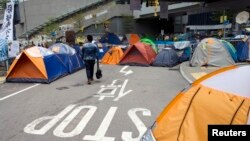Hong Kong authorities have begun clearing part of a protest site that has been occupied by demonstrators since late September.
Court bailiffs were seen early Tuesday dismantling street barricades in Admiralty, near government headquarters in the Central Business District.
Protesters put up no resistance. Some had already moved their tents and other belongings to a nearby site that police have left alone.
Last week, a Hong Kong court ordered protesters to clear the area, as well as the Mong Kok district across the harbor from Admiralty.
It is not known when authorities will begin enforcing the order to clear the Mong Kok site.
The removal comes as a new survey by The Chinese University of Hong Kong indicates a shift in public sentiment, with most now saying the protests should end.
Of the more than 1,000 respondents, 43 percent were against and 34 percent in favor of the Occupy movement. But 67 percent said the protesters should go home now.
Leaders of the Hong Kong Federation of Students, one of the main organizers of the protests, say they are urging their followers not to resist the authorities and avoid confrontations.
In Mong Kok, protesters told VOA they were prepared to vacate the areas. Mei, who only wanted to be identified by his family name, said the protesters will remain non-violent right to the end.
“We’ve determined that we will disperse peacefully when injunction comes. It’s more important not to be arrested and then we can turn to other places to continue [occupying],” he said.
The organizations supporting the Occupy movement say they will hold a meeting to discuss future actions once protesters have been cleared from the streets.
The demonstrators have been calling for fully democratic elections in 2017. They took to the streets after China ruled in August that all candidates for chief executive must first be approved by a committee that is stacked with pro-Beijing loyalists.
This report was produced in collaboration with the VOA Mandarin service.




